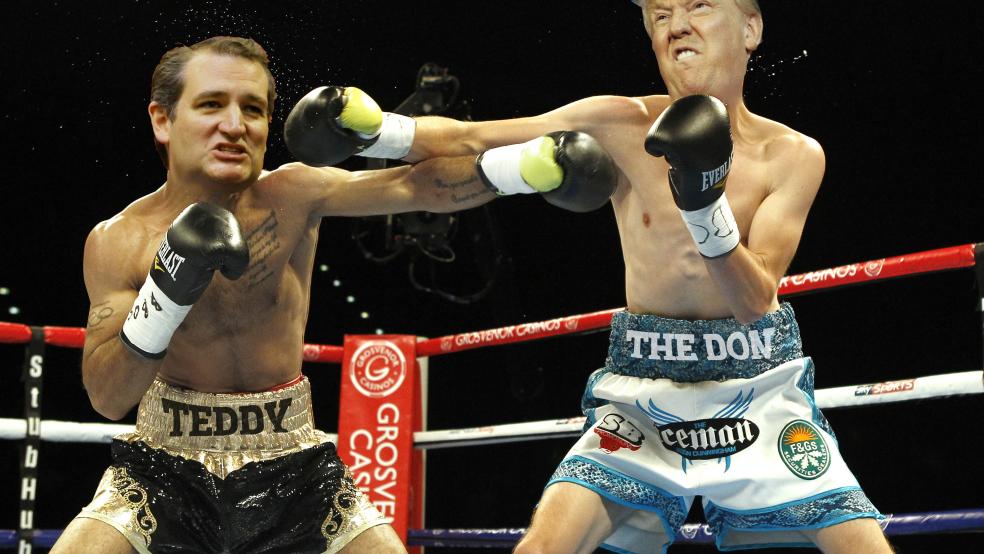The vast majority of Americans have likely never heard of the Overton Window, and the lion’s share of those who have probably associate it with a lightly regarded spy novel by former Fox News host and conspiracy theorist Glenn Beck. But the somewhat obscure theory from the field of political science is having a moment in the sun thanks to the presidential candidacy of Donald Trump.
Named for Joseph Overton of the Mackinac Center for Public Policy, the Window, at its simplest, is the range of policy proposals on a particular issue that is considered acceptable to voters. Trump, as countless pundits have noted, has apparently shifted that range on certain topics, particularly immigration and border security.
Related: The 2016 Presidential Contest Just Became a Brand New Race
Barring refugees from the U.S., imposing a religious test on immigrants and deporting 12 million undocumented individuals were ideas that, by and large, were considered beyond the pale before Trump jumped into the race. Now, six months after he descended the gilded escalator in Trump Tower to make his rambling announcement speech, modified versions of these proposals are being considered as sensible alternatives to Trump’s plans.
It’s also arguable that Trump has shifted not just the range of ideas that are acceptable to voters, but the range of presidential candidates as well. And the chief beneficiary appears to be Ted Cruz.
Let’s backtrack for a moment to consider how the Overton Window (works. As current Mackinac President Joseph Lehman, a colleague of the late Overton, wrote, “Policies inside the window are politically acceptable, meaning officeholders believe they can support the policies and survive the next election. Policies outside the window, either higher or lower, are politically unacceptable at the moment.”
Related: How Being Loathed on Capitol Hill Helps Ted Cruz on the Campaign Trail
The window can be “shifted,” though, if proposals at or beyond its extreme edges are floated by highly visible political figures.
Overton was primarily concerned with policies that increased or reduced individual freedom, but in common usage these days, the Overton Window is applied to the acceptability of specific policy proposals in the eye of the public without specific regard to the issue of freedom per se.
But perhaps it also applies to political candidates.
The New Yorker published a cartoon by Benjamin Schwartz on its website Monday capturing the idea perfectly. It depicted Meet the Press host Chuck Todd sitting across the table from an alien with two enormous eyes and a great, bulbous head. “So, Admiral Ackbar,” Todd asks, “what do you think of Cruz emerging as a more level-headed alternative to Trump?”
The alien’s response is left to the imagination, but anyone familiar with the Star Wars films — or popular Internet memes — would immediately recognize that Admiral Ackbar is best known for one line: “It’s a trap!”
Related: Trump to Cruz – Nobody Likes You
The idea that Cruz’s emergence as a viable candidate is a “trap” obviously goes to Schwartz’s opinion about Cruz, but the fact remains that until recently the Texas senator, a hard-right ideologue who struggles to find political allies even within his own party, wasn’t seen as a particularly strong choice for Republicans heading into the 2016 general election.
Most famous for orchestrating a shutdown of the federal government that did little to affect policy but pumped up his own public profile, Cruz is widely viewed as a divisive and polarizing force within the Republican Party.
Among the top tier of Trump alternatives in the Republican field, recent polls show, Cruz is the only one who loses to Hillary Clinton in head-to-head matchups.
Related: Why Donald Trump Is Making an Issue of His ‘Amazingly Excellent’ Health
Now, however, he is running second to Trump in multiple national polls of GOP voters, and leading the billionaire former reality television star in the most recent surveys in Iowa.
And a party establishment that has never really liked Cruz that much is now beginning to see him as a reasonably palatable alternative to Trump.
When CNN recently asked longtime Republican lobbyist Ed Rogers if he would support Cruz over Trump, the answer was, “Oh God, yes. Compared to Trump, he's OK.”
Related: Here’s Why Ted Cruz Could Win the GOP Nomination
That, by the way, is the same Ed Rogers who, when Cruz announced his campaign in March, observed that he is “associated with the angry, self-righteous right wing of the party” and added, “So as Cruz launches his campaign today, he has to decide whether he wants to be a Pat Buchanan figure, shaking his fist and sticking with a marginal appeal, or if he wants to embrace the Republican Party as a big tent.”





